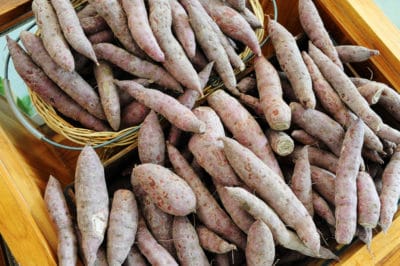What Are Yams?
Many times, people confuse yams with sweet potatoes, or they erroneously believe they are the same vegetable. Although you can use them interchangeably in some dishes, they are actually two very different roots.
Some of the differences between the two are:
- Yams are usually shaped like a cylinder and have dark, slightly hairy skin, while sweet potatoes have tapered ends and a smooth surface.
- Yams have a white flesh that is dry, and sweet potatoes have a darker, orange-colored flesh with more moisture.
- You do not see true yams outside of stores that sell specialty or imported foodstuffs.
Planting Yams
If you have planted potatoes before, you might think that growing yams is the same as growing potatoes. After all, they do appear similar, and they have “eyes” that produce sprouts. However, to grow yams, you have to plant slips instead of chunks of the root.
You can purchase slips online or from someone who grows yams, but it is a simple process to produce your own slips. Place the entire yam in a planting flat and potting soil until it reaches halfway up the root. Then, keep the yam in a warm, moist area until slips begin to form.
Once the slips are about 10 inches (25 cm) long, you can plant them directly into the ground. Keep them moist and fertilize every three weeks, and you can anticipate an ample harvest.
Growing Requirements for Yams
If you want a successful harvest, you need to provide the correct growing environment for the young plants. You need to plant them somewhere they get sun the majority of the day, and you need to be sure to water them frequently. However, be sure the area in which you plant them has adequate drainage. Yams can easily rot if the roots are too saturated.
Tip: Keep the soil warm and moist using a thick layer of organic mulch. Mulch also helps control weeds.
As long as you give the yams enough room to grow and tend them carefully, you can harvest enough yams to eat them both before and after the holidays.
